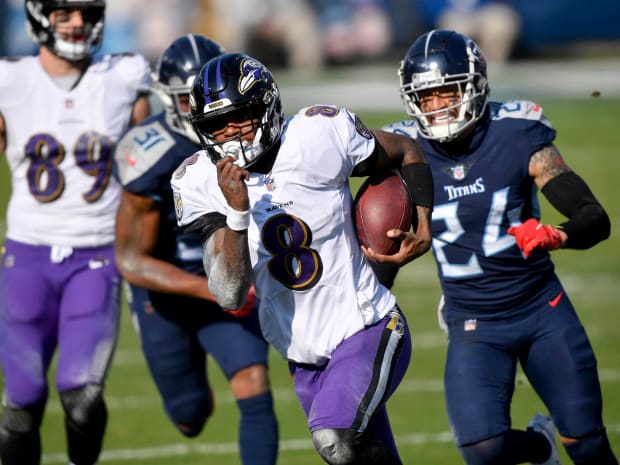Whether Lamar Jackson's playoff narrative was fair or not, he didn't shy away from it. But he squashed it on his way to the divisional round.
It would have been fair to say that “the narrative” didn’t matter. Lamar Jackson was 0–2 in his first two playoff games, yes. But he was also the youngest quarterback ever to start an NFL playoff game when he did so as a rookie, in a season when he only became the starter midway through. And then there was last January, that stunning home defeat as the AFC’s No. 1 seed—a team loss, but one that Jackson would bear more than any other Raven. How could anyone make any firm conclusions off of such a small sample size?
But instead of discounting the narrative—that he couldn’t win a big game—Jackson confronted it. As he prepared for his third postseason in his third NFL season, the Baltimore quarterback talked all week about changing the narrative. As silly and meaningless as a tag like a 24-year-old QB being 0–2 in his first two playoff starts is, the truth is those losses stung Jackson. He burned to win a playoff game—the first step to winning a ring—and while the narrative might not have much worth, he did want to change it.
And so, Jackson did both, with a 20–13 win against the Titans Sunday afternoon.

This time, the Ravens were in Tennessee’s home stadium. They were a wild-card team. The 2019 regular season was awe-inspiring and paradigm-shifting, but much of the Ravens’ 2020 regular season had been frustrating.
Early in the year, the offense seemed to be searching for its identity on the fly. Jackson missed a game against the Steelers in Week 12 after testing positive for COVID-19. And the pandemic meant that the reigning MVP couldn’t have the kind of offseason he did a year ago. His 2020 resolutions to refine his deep balls and not lose velocity on his throws outside the numbers became exponentially more difficult when he couldn’t have regular in-person sessions with his throwing coach, Joshua Harris, or his receivers.
But the Ravens look now like one of those teams that got hot at the right time, an oversimplification of the work it takes for an offense to get unstuck in a year interrupted by a pandemic and when every defensive opponent in the league has resolved to figure you out. Of course, there’s a limit to how much even the smartest defensive minds or savviest players can do to do stop a play like Jackson’s 48-yard touchdown run, on which he reached a top speed of more than 20 miles per hour (per the NFL’s NextGen stats) as he knifed across the infamous Titans logo and sprinted on a diagonal toward the pylon. That play erased the remainder of Baltimore’s early 10–0 deficit, the kind of hole from which Jackson and the Ravens had previously not been able to climb out. Another narrative corrected: Marquise Brown, who expressed frustration over social media in November about a dearth of targets, was the team’s leading receiver, with seven catches for 109 yards.
Baltimore simply followed a different trajectory this season—their midseason struggles seem to have created their late-season successes. After Jackson returned from the COVID-19 list, the Ravens won their final five games of the regular season, a necessity to fight their way back to being the AFC’s top wild-card seed, and the offense never amassed fewer than 385 yards from there on out. Sunday against the Titans was another 400-yard performance, including 136 yards rushing from Jackson, the third-highest total for a quarterback in NFL playoff history.
No, Jackson wasn’t perfect: His early-game interception came on a very off-target pass, when he threw inside his receiver, who had outside leverage on Titans cornerback Malcolm Butler. That mistake led to the Titans building their 10-point lead. But unlike last January, when Jackson threw the ball a career-high (by far) 59 times, the Ravens stayed true to who they and their quarterback are despite an early hole. Jackson amassed his rushing yardage with a variety of highlight plays, like his touchdown run and the 23-yard dash on third-and-two, a keeper after a fake handoff, that helped set up Baltimore’s go-ahead TD early in the third quarter. There were other times when his legs helped him make plays in the passing game, like a third-down throw on which he out-ran the pursuit from speedy CB Adoree' Jackson to get off a 17-yard throw to Mark Andrews, keeping alive Baltimore’s first scoring drive.
This is when Jackson is at his best. We saw it in the final five weeks of the season, and with great anticipation, we saw it in a playoff game. Jackson has always thrived off of not being who the rest of the world thinks he is. On Sunday, he corrected this narrative—but he still has others to challenge.